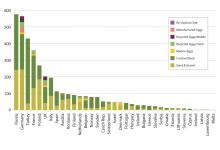Pre-tax profits at Aggregate Industries fell by more than 50% last year according the UK group's latest accounts. Despite this, turnover was up 9% to £1.2bn.
The Leicestershire-headquartered business has reported a pre-tax profit of £46.2m for the year to 31 December 2017, down from £105m in the previous 12 months.
However, in a report out this week on www.insidermedia.com, it has been revealed that Aggregate Industries' turnover increased from £1.1bn to £1.2bn over the same period.
The company, which was founded in 1858, manufactures and supplies a range of heavy building materials, mainly aggregates including stone, asphalt and concrete, to the construction industry and other business sectors. It also manufactures and imports cement.
Aggregate Industries operates more than 60 quarries in the UK and has several bases throughout mainland Europe and Scandinavia.
In the newly filed accounts, the company said the rise in turnover was mainly due to the "hive up" of trade and assets from several subsidiaries during the course of the year. The term hive up is commonly used to describe a type of restructure within a group of companies when the net assets of, and business undertaken by, a subsidiary are transferred up into the parent company.
Aggregate Industries' operating EBITDA dropped from £177.5m to £168.3m after a loss of £19m on the disposal of former subsidiary Yoeman Halsvik AS.
A statement signed off by the board said: "It is anticipated that UK construction output will reduce in 2018, albeit not significantly.
"As a result, it is envisaged that demand levels for our products and services will be, at best, flat.
"The outlook for the sector is encouraging for the medium to long term, with major infrastructure projects and the need for increased housing provision.
"However, the slowing economy and the uncertainty emanating from the decision to leave the European Union is expected to suppress investment in the short term.
"In addition, it is anticipated that input costs, particularly oil related and energy will increase at levels well above inflation.
"However, we have instigated a number initiatives aimed at reducing the overall cost base of the business. These are focussed, principally, in the operational excellence, procurement, logistics and sales and general administration functions.
"The target will be to further improve the key performance in indicators of tehe business but in an, at best, flat market scenario much will depend on our ability to recover the cost increases through price and service improvements."
In 2005 the company was acquired by the Swiss-based Holcim Group while in July 2015 it became a member of LafargeHolcim following a global merger between Lafarge and Holcim, creating one of the biggest construction materials suppliers in the world.





